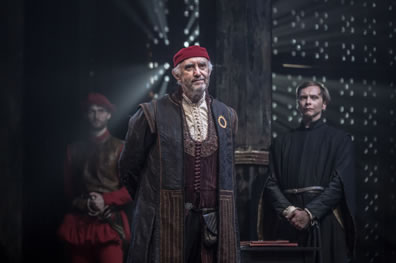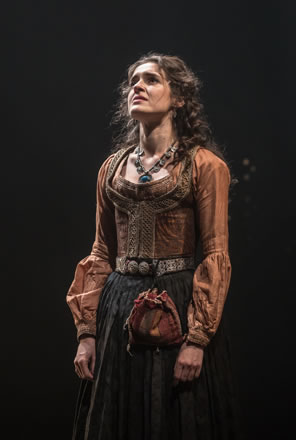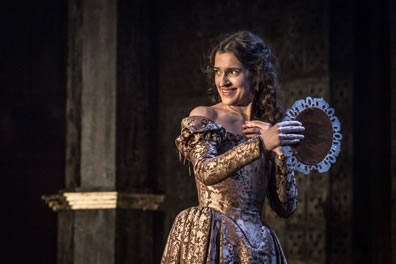The Merchant of Venice
Racism Unmasked at a Time of Renaissance
Shakespeare's Globe, Eisenhower Theater, John F. Kennedy Memorial Center for the Performing Arts, Washington, D.C.
Wednesday, July 27, 2016, Box 6, Seat 8 (loge left, far right)
Directed by Jonathan Munby

Shylock (Jonathan Pryce) waits for justice in the Venetian court as Portia's servant Stephano (Christopher Logan, who also plays the Prince of Arragon) looks on in the Shakespeare's Globe production of William Shakespeare's The Merchant of Venice. Photo by Marc Brenner, Shakespeare's Globe.
Typically, two speeches stand out in William Shakespeare's The Merchant of Venice: Shylock's "Hath not a Jew" and Portia's "The quality of mercy is not strained."
But not this time. Not in this too-close-for-comfort version of the play produced by Shakespeare's Globe in London and now touring the United States (currently at the Kennedy Center in Washington, D.C., after a stint in New York's Lincoln Center Festival and before moving to the Chicago Shakespeare Theater, then on to China and Europe). The first half of Shylock's famous speech gets a garbled delivery as Solanio and Salarino harass the Jew, and Portia's speech runs through the filter of Shylock's consternation as she speaks it.
This is not criticism. Both incidences have a purpose as the play shifts its bearings to two other passages: the second half of Shylock's "Hath not a Jew" speech and his counter argument to mercy, "are you answered yet?" in the trial scene. Under the thoroughly studied and steady hands of Director Jonathan Munby, this Merchant of Venice directly juxtaposes intense racism with the reactions of those who endure it, exhibiting persistent prejudice's causes and effects—effects that include not just reactive violence but also emotionally wrenching fissures in the ruling class. It is a Merchant of Venice reflective of modern day Europe and North America grappling with rising anxiety over immigration, religious-fomented terrorism, and the resultant excesses of xenophobia.
However, it doesn't take sides. Shylock is, by turns, a soulless merchant, a victim, a maniacal zealot bent on murderous revenge, and a victim again. Meanwhile, Gratiano is unrepentantly racist, but his racial-tainted, cynical bating of Shylock during the trial scene garners big laughs.
At the production's center is Jonathan Pryce as Shylock, maybe the finest performance of the role I've ever seen for its purity of character. In an interview with Washington Post theater critic Peter Marks, Pryce stressed his text-centric approach to roles, eschewing background research. “That’s why you’ve got a writer,” Marks quotes Pryce. “If you looked at my script, you’d see that there isn’t a mark in it.” Pryce's Shylock carries the weight of a long life of warring contradictions: commercially successful but emotionally drained, finding strength in the close-knit community of his "tribe" while weathering the fearful abuses of the larger society. My affinity for Pryce goes back to seeing him in three Royal Shakespeare Company productions in 1978 (memorable turns as Petruchio in The Taming of the Shrew, Angelo in Measure for Measure, and Octavius in Antony and Cleopatra), but I nevertheless am awed by his mastery of Shakespeare's text, his clear, concise, and naturally rendered readings emerging from a complete immersion in his character.
The understandable paranoia that comprises so much of Shylock's personal makeup he enforces on his daughter, Jessica, who yet is a young woman with a wellspring of passion living in a Venice of exciting romantic possibilities. Playing Shylock's daughter is Pryce's daughter, Phoebe Pryce, fresh out of the Royal Academy of Dramatic Art and already displaying mesmerizing talent. The production gradually shifts its focus to Jessica, and the younger Pryce more than ably carries the load.
Munby is not overt in depicting parallels between the foundational prejudice of The Merchant of Venice and today's racial, ethnic, and religious frictions. Typical of most productions at Shakespeare's Globe (a full-scale reproduction of the outdoor theater of Shakespeare's day), The Merchant of Venice uses Renaissance costumes. Designer Mike Britton's set is a mostly bare platform with a smaller, raised platform in the middle and a spare number of props. The back wall is a metal grate through which pinpoint light streams. Oliver Fenwick's lighting design creates an ever-evolving environment of spotlights, shadows, warm glows, and those bars of light that make one think of a jail cell, all effectively serving as another character in the play representing the many personalities of Venice and Belmont. Despite the guarantees of legal rights for all residents and the inclusive values of certain influential citizens, a community's tolerance level is measured by the sum of its many parts, an equation that can be skewed by the outsized volume or actions of certain other citizens. This Venice wants to be a shining city on the hill, but it behaves more like a prison.
This theme is further visualized in the musical prelude as a quartet of musicians—one clarinet and the rest with drums and percussion—lead the rest of the cast in a raucous dance. All are wearing masks. Nevertheless, we see the real individuals emerge as this party carries over into the opening act. Two Jews are roughed up and the external badge of their faith, the skullcap, abused. You also might recognize Antonio (Dominic Mafham) by his demeanor as he withdraws from the general joy of the scene before removing his mask and departing.
Why is Antonio sad? Because he is gay and in love with Bassanio (Dan Fredenburgh). I know I'm beginning to resemble a cuckoo clock at 12, but I'll keep harping against this tiresome interpretation of Antonio's sadness when the mere fact that he suffers depression allows a more resonant reading of the character—especially in a Merchant with the tonal quality Munby has otherwise achieved with this production. I had high hopes from the way Mafham spoke his opening lines, which is as succinct a description of depression as you will find anywhere:
In sooth, I know not why I am so sad.
It wearies me; you say it wearies you.
But how I caught it, found it, or came by it,
What stuff 'tis made of, whereof it is born,
I am to learn;
And such a want-wit sadness makes of me,
That I have much ado to know myself.
However, once Bassanio comes on stage and Antonio lingers in letting go of the younger man's hand after shaking it, Mafham becomes the unrequited doter of norm. It wearies me. (Note to all directors of future Merchants of Venice: Depression does not necessarily happen by reason.) Mafham even makes a move to kiss Bassanio at the end of the trial scene, but Bassanio rejects the advance, though he maintains a friendly attitude toward his mentor.
What distinguishes Bassanio in this production—a character rarely distinguishable—is his lack of racism. It's not just that he willingly turns to Shylock as a source of credit for financing his venture to Belmont. Fredenburgh's Bassanio is noticeably uncomfortable with Antonio's harsh attitude toward Shylock in the bond-sealing scene (Antonio's hatred is so ingrained he maintains it to his imminent death, turning "Jewish heart" into a rancid slur). In the trial scene, Bassanio alone speaks to and of Shylock as a fellow human being. "This is no answer, thou unfeeling man, to excuse the current of thy cruelty," he says. Only when he tries to comfort Antonio does he refer to "the Jew," and when the depth of Shylock's cruelty becomes all too obvious, Bassanio resorts to calling him a devil (which may or may not be a racially tinged epithet, but Fredenburgh makes it sound like confounded exasperation). Bassanio also is uncomfortable with Gratiano's blatant racism: "Thou art too wild, too rude and bold of voice" carries a double meaning when Bassanio uses it to describe Gratiano, as played by Jolyon Coy.
Beset on all sides by physically abusive Gratianos, economically abusive Antonios, and almost everybody else's verbal abuses, Shylock is finally compelled to remove Venice's mask of legal equal rights and modern thinking—a Venice that historically was the cradle of the Renaissance—in his fight for justice. Solanio (Raj Bajaj) and Salarino (Brian Martin) react to Shylock's "Hath not a Jew" speech with threatening gestures until he turns his window into a mirror. "And if you wrong us, shall we not revenge?" he says, stopping the two Christians cold. "If we are like you in the rest, we will resemble you in that. If a Jew wrong a Christian, what is his humility? Revenge. If a Christian wrong a Jew, what should his sufferance be by Christian example? Why, revenge. The villainy you teach me I will execute, and it shall go hard but I will better the instruction." Isolated, that passage could be decried as an excuse for violence—its final phrase makes one shudder. But in the face of ongoing violence against him, and Pryce delivering these lines from a place of lifelong-lived truth, this passage carries a troubling resonance.
And so, when he is enjoined to show mercy on his tormentor, Shylock again turns the tables. "You'll ask me why I rather choose to have a weight of carrion flesh than to receive three thousand ducats: I'll not answer that, but, say, it is my humor. Is it answer'd? What if my house be troubled with a rat and I be pleased to give ten thousand ducats to have it baned? What, are you answer'd yet?" When Portia (Rachel Pickup), disguised as the lawyer, gives a rote testimony on the quality of mercy, not only will Pryce's Shylock have none of it, we can see how such a moral creed already has been bankrupted by the ruling class's own behavior.

Shylock's daughter, Jessica (Phoebe Pryce), escapes the psychological prison of her father's house for the wealth and fun of Christian life, but encounters ingrained prejudice there in the Shakespeare's Globe production of William Shakespeare's The Merchant of Venice playing at the Kennedy Center. Photos by Marc Brenner, Shakespeare's Globe.

Shylock represents the results of individual and state-enabled persecution and disenfranchisement on the basis of race, ethnicity, and religion. To see racism's insidious impact at work, watch Jessica's story unfold. Her home is effectively a prison thanks to her father's cold, hardened heart, and the two Pryces deliver an electric moment when they argue in Yiddish (on another occasion, Coy's Gratiano spews vehemence in Italian). Lorenzo (Andy Apollo) is Jessica's escape. She is not naive in this, per se, for this Lorenzo's whole motivation for eloping with Jessica is romantic love. He truly admires her, heart, soul, mind, and body, and has no seeming issue with her being Jewish. In fact, the racism in his fellows galls him. I've never noticed how many racial epithets are aimed at Jessica before seeing Apollo's reaction to them. "But who comes here? Lorenzo and his infidel?" Gratiano says when the couple along with Salarino arrives at Belmont; Apollo's Lorenzo glares by way of response. Gratiano then welcomes Lorenzo and Salarino but notably doesn't welcome Jessica, getting another glare from Lorenzo. Finally, Gratiano shows some kindness when he tells Nerissa, "Cheer yond…" he pauses, "… stranger. Bid her welcome." He, of course, can't do it himself; and Nerissa barely can.
While Gratiano is more vocal in his prejudicial loathing of Jessica, all the other characters except Bassanio avoid her as a leper. Between the scenes of Bassanio and Gratiano returning to Venice and Portia's and Nerissa's departure from Belmont, Munby has inserted a moment in which Lorenzo is teaching Jessica to dance in the style of upper class (i.e., Christian) Venetian society. Portia enters and watches before displacing the awkward Jessica and finishing the dance with Lorenzo. This appears to be a kindness on Portia's part until she casts a superior glance at Jessica. This moment reverberates when Lorenzo later asks Jessica, "How dost thou like the lord Bassanio's wife?" Pryce's Jessica hesitates with a forced laugh and replies, disingenuously, "Past all expressing."
The relationship between Jessica and Lorenzo is richly complex in this production, thanks to both actors mining a cross-cultural subtext between them. Jessica is delighted when Lorenzo gives her a cross pendant and will make her a Christian. But however much she assimilates, and whatever good intentions Lorenzo has, Jessica will always be a Jew to the others and, he's learning, to him, too—and, as she learns by the end, to herself, as well. Her original naïveté was in failing to understand what made her father's heart so cold and hardened. A scene tacked on at the play's conclusion shows us Shylock's enforced baptism juxtaposed with Jessica in Belmont succumbing to a wailing Hebrew lament which eventually blends with the Christian chants of the baptism.
Did I mention this play is a comedy? Shakespeare intended it as such, and despite his obvious thematic purposes, Munby honors that intent—especially (disturbingly) in the playing of Gratiano. That Coy can deliver such a virulent racist as endearingly funny is as conflicting for me as acknowledging Ty Cobb's deserved place in the Baseball Hall of Fame. The casket-choosing sequences in Belmont rely on over-the-top performances of the Princes Morocco (Giles Terera) and Arragon (Christopher Logan), which is how Shakespeare writes them. The production's greatest comic gem is Stefan Adegbola's Launcelot Gobbo, Shylock's servant (and Jessica's best friend) who transfers to Bassanio's service. In his shtick debating with his conscience and the fiend about leaving Shylock's service, Adegbola fetches members of the audience to play conscience and fiend, treating them like puppets but eventually getting them to speak their lines. It's a fourth-wall-breaking moment Adegbola would maintain throughout the play (not unusual in Shakespeare's Globe performances). Adegbola's Gobbo has a lovely relationship with Pryce's Jessica (and even Pryce's Shylock treats him with a modicum of respect), but his interactions with Apollo's Lorenzo don't quite gel. That's a hard thing to do, frankly, because the original Gobbo, undoubtedly Will Kemp, was just being Will Kemp, and modern stagings seeking to establish a conceptual consistency have trouble melding in the boisterous one-man-show comedy Kemp was famous for.
Not that this staging of The Merchant of Venice is modern. But it sure feels that way.
Eric Minton
July 29, 2016
Comment: e-mail [email protected].
Start a discussion in the Bardroom



 Find additional Shakespeareances
Find additional Shakespeareances